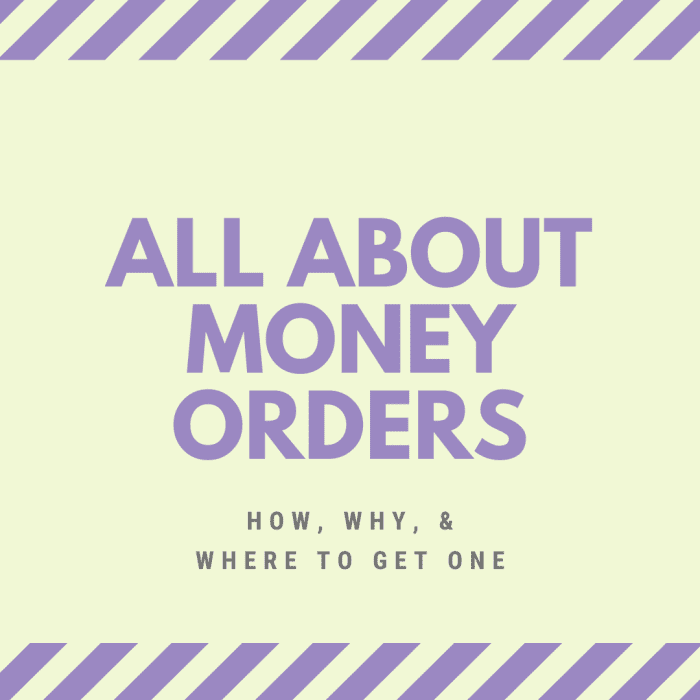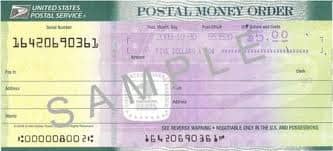What Did Americans Purchase In Order To Raise Money For The Troops?
Sarah is a bona fide cheapskate striving to find a balance between saving money and making money, because both take a lot of time.

This guide will help you with key facts and information about money orders.
What Is a Money Order?
A money order is a printed form of money transfer that is "backed" by cash. It is usually issued by a bank or post office (because they are affiliated with the federal system), but you can get them from other places. A money order is used instead of cash because it prevents people from using fake money, and it provides proof of the money transfer for the paperwork and tracking purposes of both entities.
Think of it like buying a gift card—you use cash to purchase a piece of paper that is worth the same amount. There is usually a processing fee, and the recipient can use it like cash, not credit. A money order, however, must be deposited or cashed in and can't be used by the recipient in any other way.
Money orders are usually available for sums up to a specific amount. Different businesses will allow you to purchase different amounts.

Sample Money Order
Should I Get a Money Order or a Cashier's Check?
There is a difference between a money order and a cashier's check, and that difference is based on the amount you need. Most banks and money-issuers have a cut-off point for money order amounts. For example, Bank of America's cut-off point is $1000. Anything $1000 and below is a money order, and anything above $1000 is a cashier's check. The reason that you should care is that a money order usually costs less than a cashier's check. For example, at Bank of America, a money order costs $5 while a cashier's check costs $10.
Why Would I Get a Money Order?
Money orders guarantee the security of your money for the payee. It is trusted because it is required that the money order payer must pay the amount in cash ahead of time. This prevents the recipient from having to worry about whether a check will bounce. For this reason, many landlords require their tenants to pay in money orders.
Read More From Toughnickel

A money order looks a lot like a check.
Where to Get a Money Order
- Wal-Mart: This may be your cheapest option! As of 2018, each money order costs 70 cents and can be for up to $1000. You can get more than one money order at that rate, and you can use cash or debit card. Being able to use a debit card can be a great option if you don't normally carry a lot of cash, and it will provide you with a digital record of the purchase. They also have many other money services, so they can be a one-stop shop. I don't normally advocate going to Walmart, but they are excellent at keeping prices low and providing many items and services that people need.
- U.S. Postal Service: This is another cheap option, depending on how much money you want. You can get up to $1000 per money order. It costs $1.20 to get a money order of up to $500, and $1.65 for a money order of $500-1000. Different fees apply for international money orders. They have a very easy-to-understand table on their website.
- Your Bank: Almost all banks offer cashier's checks and money orders. However, The rates are different in each state, so you will have to call and ask.
- CVS: This is another low-cost way to do it, depending on how much money you need to get. Some CVS locations only charge 99 cents for a money order, but the cut-off is $300. That can be a big hassle if you need a larger sum of money. However, you can get an unlimited amount of money orders at this amount. Another drawback to using CVS is that they usually only take cash for their money orders!
- Western Union agent: Your local Western Union agent can print a money order for you. Charges and fees vary. To find your agent, use their locator. Be sure to click "Money Order."
- Payday Loan Shops: Places like Check N Go and Advance America often offer money orders. These shops are usually locally run, so their charges and limits vary.
- Grocery Stores: Many grocery stores offer cashier's checks and money orders. However, the rates vary, so you will have to call and ask.
What Do I Do With the Money Order?
Once you have the money order, there is a line that you need to sign. The field is usually labeled "Purchaser," "Signer for Drawer," or something along those lines. That's you, and until you sign it, no one can cash it. Some people recommend waiting until you are ready to hand it over to sign it. Do not sign the back of the money order. The person who cashes it will sign there.
It's a good idea to take a picture or scan your money order before giving it to the recipient. That way, you can record which institution you got it from, the amount, and the date.
This article is accurate and true to the best of the author's knowledge. Content is for informational or entertainment purposes only and does not substitute for personal counsel or professional advice in business, financial, legal, or technical matters.
BODYLEVIVE from Alabama, USA on February 14, 2017:
I had a bad experience with a money order and from now on if I need one, I'll get it from the post office or Walmart.
What Did Americans Purchase In Order To Raise Money For The Troops?
Source: https://toughnickel.com/personal-finance/How-to-Get-a-Money-Order
Posted by: wickershambetwou61.blogspot.com

0 Response to "What Did Americans Purchase In Order To Raise Money For The Troops?"
Post a Comment